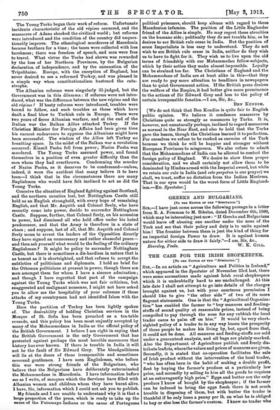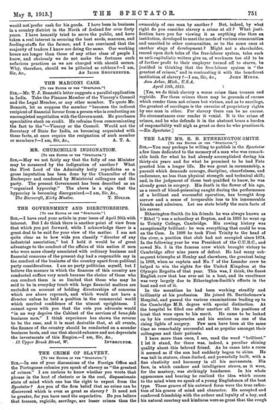THE CASE FOR THE IRISH SHOPKEEPER.
[To THE EDITOR OP THE " SPECTATOR...3 SIR, —In an article on " Agriculture and Politics in Ireland," which appeared in the Spectator of November 23rd last, there were some accusations made against Irish rural shopkeepers which it is undoubtedly hard to see unchallenged. At this late date I shall not attempt to go into details of the charges brought against us, but with your courteous permission I should like to give " the other side " of two of its more flagrant statements. One is that the "Agricultural Organize. tion" has enabled the farmer to "buy manures and feeding. stuffs of sound quality at reasonable prices, instead of being compelled to pay through the nose for any rubbish the local trader cares to palm off on him." It would be very short- sighted policy of a trader to in any way lessen the prosperity of those people he makes his living by, but, apart from that, it could not be done. All manures and feeding-stuffs are sold under a guaranteed analysis, and all bags are plainly marked. Also the Department of Agriculture publish and freely dis- tribute leaflets, where the values and prices of manures are given. Secondly, it is stated that co-operation facilitates the sale of Irish product without the intervention of the local trader, " who has often been in the habit of making a double profit, first by baying the farmer's produce at a particularly low price, and secondly by selling to him all the goods be requires at an extravagantly high price." Eggs and butter are the only produce I know of bought by the shopkeeper ; if the farmer can be induced to bring the eggs fresh there is not much trouble in disposing of them, but with butter the trader is thankful if he only loses a penny per lb. on what he is obliged to buy or else lose the farmer's custom. I know no trader who would not cash for his goods. I have been in business
in a country district in the North of Ireland for over forty years. I have honestly tried to serve the public, and have taken a real interest in securing the best seeds, manures, and feeding-stuffs for the farmer, and I am convinced that the majority of traders I know are doing the same. Our working hours are longer than those of any other class of people I know, and obviously we do not make the fortunes such nefarious practices as we are charged with should secure. Why, therefore, should we be pilloried as robbers P—I am, Sir, &c., AN IRISH SHOPKEEPER.



















































 Previous page
Previous page